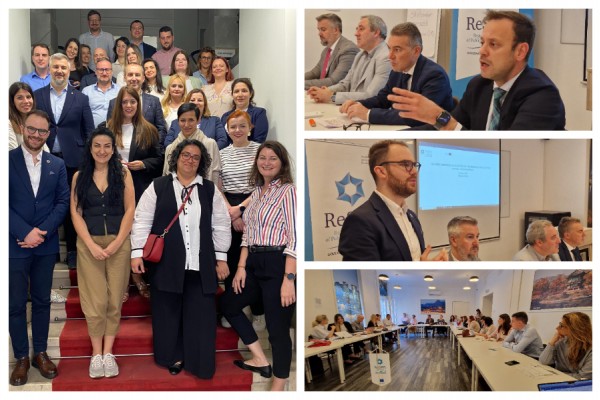
Capacity Building on the Fundamentals of the EU Accession Process Toward Faster EU Integration
4 – 6 June 2024, Belgrade, Serbia
The first in a series of training modules on negotiation chapter clusters for 2024-2025, this event brought together 25 public administrators from across the Western Balkans involved in the EU accession process. The focus was on the latest updates related to Chapter 23 (Judiciary and Fundamental Rights) and Chapter 24 (Justice, Freedom and Security).
The programme brought together 25 public servants from across the Western Balkans involved in the EU accession process, who empowered their knowledge on the latest updates related to Chapter 23 (Judiciary and Fundamental Rights) and Chapter 24 (Justice, Freedom and Security). Topics on public administration reform and public procurement were also tackled more horizontally.
Mr Giulio ZANNI, Coordinator for Chapter 23 from the EU Delegation in Serbia, emphasised the importance of accession negotiations on Cluster 1 and the progress made in these chapters to the overall advancement in accession negotiations, stressing the new and invigorated momentum in the EU enlargement process, also in the new geopolitical context. Mr. Zanni also highlighted the essential role the Growth Plan is expected to play in the process.
Mr Branislav STOJANOVIĆ, Assistant Minister, Ministry of Justice and Miloš SAMARŽIĆ, Ministry of European Integration, addressed the attendees on behalf of the Serbian administration, underlining the importance of such multi-module training programmes for the overall progress in the accession negotiation process. Both officials emphasised that despite the challenges faced by both sides (EU and WBs), the efforts of the public servants in advancing the accession are constantly growing.
Genti XHAXHIU, ReSPA Programme Coordinator, emphasised the importance of professional development for public servants: "Public servants need to acquire specific knowledge, constantly improve their skills, and stay committed to continuous professional growth. Participating in activities integral to their daily work, they contribute to advancing toward EU membership. This series of training sessions aims to provide the latest updates and practical knowledge to facilitate a smoother EU accession process, and as such, are essential for meeting EU accession criteria and fostering good governance, as well as the rule of law in the region."
Guided by prominent experts Aleksandar Andrija PEJOVIĆ, PhD (EU integration expert), Simonida KACARSKA, PhD (Director, European Policy Institute), Miodrag RADOVIĆ (EU integration expert), and Marija VLAJKOVIĆ (lecturer of EU Law, University of Belgrade), participants will develop the practical problem-solving skills related to negotiating Fundamentals. Through hands-on exercises and discussions, they will explore the current state of EU integration, identify key challenges to EU membership, and examine the specific reform agendas and policy areas under Cluster 1.
The European Union has confirmed its unequivocal commitment to the EU membership perspective of the Western Balkans and has called for an accelerated accession process and further advancement of gradual integration. The need for accelerated reforms and economic initiatives expected to benefit the citizens directly and help enhance GDP per capita in the region to match the EU average is the focus of the most recent policy instrument in this field- The New Growth Plan. The foundation of the process still lies in the respective Stabilization and Association Agreements, market integration and alignment with the body of EU law. The prospect of EU membership is an incentive to bring forward and step up with the reforms in the Western Balkans, mostly related to the political and economic governance, the fight against corruption, public administration reform, the rule of law and media freedoms and supported by available financial instruments.



